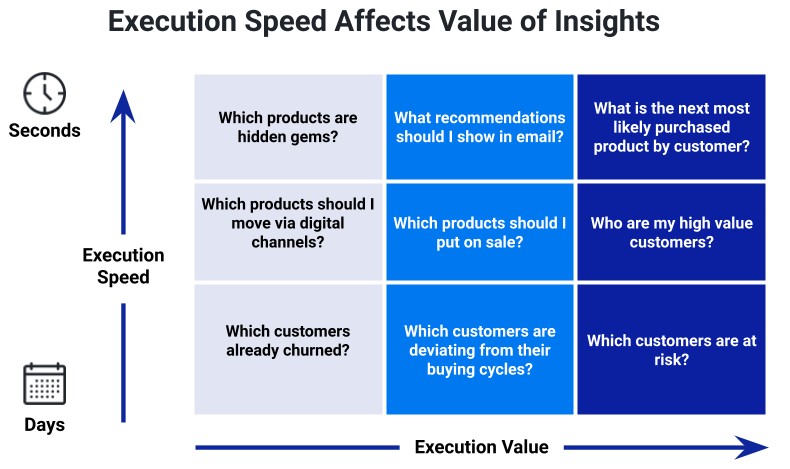
Artificial Intelligence in Retail: The Future of Commerce
Marketing teams in the retail industry are staring down the eye of a perfect storm. While retail is making a strong comeback, customer expectations are rising and marketers are facing new challenges every day. For retailers, technology has never been more important to success. Technology has also never been so far advanced. AI is officially here and should be part of every marketer’s day to day.
How AI is changing retail
AI is changing retail in a number of ways. First, the retail industry is uniquely positioned to enjoy the greatest positive impact of artificial intelligence (AI) from technologies that offer closed feedback loops for collecting, analyzing, and using consumer data. This will help teams identify opportunities for growth, automatically deploy campaigns, support advanced workflows, and more.
Second, retail marketing teams will be able to use these cutting-edge technologies to draw a clear parallel between AI and revenue. This presents an opportunity for marketing teams to prove their value to leadership in a way that is transparent and compelling.
Retail teams simply cannot ignore the potential of AI. But before you start looking for AI-driven solutions, it’s important to understand the benefits and challenges of AI as well as all the ways your team can use it. Let’s get started.

The benefits of embracing AI in retail
This new era of AI presents enormous opportunities for retailers. Let’s take a close look at three notable and immediate benefits that can come from implementing an AI-enabled retail marketing solution.
1. Maximize the impact of data
Today, most retail marketing teams rely on disparate customer lists that are siloed by channel. While these lists are usually quite reliable, they provide little context on customer behaviors and are manual and time-consuming to produce. This means they only tell one part of the customer’s story and become stale quickly.
An AI-driven retail marketing solution gives teams a central location to observe, decide and act on customer, behavior and product data, which will simplify cross-channel marketing initiatives. Additionally, this type of solution can regularly collect feedback from live campaigns, giving your team access to a wealth of customer and behavior data that can improve the agility and accuracy of marketing efforts.
2. Democratize access to data
It’s finally possible to stop holding data hostage by making it searchable, visible and accessible to all business users. Even if only a small group of people can actually use the data to run campaigns, allowing everyone to view and query customer data to better understand shopper behavior delivers tremendous value.
3. Increase speed to execution
AI not only helps get campaigns out the door faster by taking over previously time-consuming and manual tasks, but it also gives marketers faster insight into data. Let’s look at the chart below for a visual on how this works.
In the chart below, we can see how execution speed affects the value of your data insights. For instance, let’s look at the bottom row. Without AI, you would have to spend days determining which customers churned by analyzing who already abandoned the customer journey. This is useful to know, but you’ve unfortunately already lost those customers.
With predictive AI, you can pre-emptively identify shoppers who are at risk of churning and then take action to convince them to continue their journey. This way, you’ll have a chance to keep these customers instead of scrambling to win them back when they’re already lost.

Overcoming Challenges to Effective AI in Retail
Despite the enormity of these opportunities, a lot still needs to happen before the promise of AI in retail can reach its full potential. Specifically, brands face common challenges and risks in fully embracing AI:
Maintaining promises made to shoppers
Many brands have asked shoppers to sign up for different types of communications. Delivering on those promises and managing the experience to their expectations still requires lists.
To get past this challenge, retailers need a sophisticated system that can act as a middle layer between data storage and channels of execution and that can manage communications at an individual level.
Giving AI constraints
There’s no doubt that AI can supercharge marketing campaigns by using large datasets to make decisions that humans simply aren’t capable of. But we also can’t let AI make decisions alone. Rather, we need to give it constraints, for example to preserve margins.
To get past this challenge, retailers need a solution that offers the power to focus AI on specific goals.
Balancing shopper behaviors and desires when they’re at odds
Using AI to adjust email frequency based on each shopper’s engagement can go a long way when it comes to inbox management, but what happens when shopper behaviors and desires are at odds?
Consider the case of a shopper who wants to receive a brand’s emails and engages with them, but still only wants three emails a week, not one email a day. Typically, AI will read this shopper’s engagement as a sign to send more emails, even though that’s not what the shopper actually wants.
To get past this challenge, retailers need to find a balance between humanity and technology. This means using AI as a guide for your overarching strategy, but still listening to customers even if it runs counter to the AI-driven analysis.
Understanding risk vs. return
Utilizing AI in retail, whether it’s online or in-store, comes with risks, especially when dealing with customer interactions.
AmazonGo stores helped pioneer the “cashless grocery store”, where shoppers use their smartphone app to enter the store, and cameras and sensors track what’s taken off shelves. Items are then charged to the individual’s Amazon account at checkout.
The reward is people don’t have to checkout, saving time, providing them with a seamless experience, and giving the store direct purchasing behavior data. The challenge? Not only does Loss prevention becomes a more difficult game but the human element of visiting the grocery store is removed.
For retailers, it’s important to understand what has a bigger impact on the bottom line. Just because you can use technology doesn’t always mean you should.
Use Cases for AI in Retail
Clearly, AI is a worthy investment for retailers, even if your team does encounter a few challenges along the way. Based on those benefits, how exactly can your team use AI for marketing initiatives? Let’s break down six use cases employed by many retailers.
-
- Personalized product recommendations – By linking customer, behavior and product data, an AI-driven solution makes it easy to deliver highly relevant personalized product recommendations. You can then use these recommendations in your emails, on your website, on advertising channels or anywhere else shoppers engage with your brand.
-
- Adaptive onsite experiences – Adaptive experiences allow you to customize your site’s creative elements to match each shopper’s desired experience by using information about recent behaviors, including browse activity or recent purchases, and then layering it with predictive customer data. This can be used in many ways, such as delivering personalized offers and product recommendations onsite.
-
- Predict customer behavior – With an AI-driven solution constantly collecting relevant data, you’ll gain the ability to make high-quality predictions about a customer’s future habits. For instance, AI models can study a customer’s typical browsing habits and find product affinities. Once you know which product attributes a customer prefers, you can show them relevant product recommendations that feature the traits they desire. This will help you drive more sales, increase average order values and secure greater loyalty through relevant outreach.
-
- Find at-risk customers – AI helps you automatically determine when an individual customer falls out of their typical buying cadence – signaling they may be about to end their customer journey and become a lost buyer. Once your solution has found an at-risk shopper, it can automatically send a special offer or well-timed personalized product recommendation to bring them back into the fold. This entire automated process uses 1:1 personalization and requires no intervention from the marketing team.
-
- Provide real-time customer support – Customers now want the ability to ask questions and make a purchasing decision without having to dig – or at worst, pick up the phone. AI-driven chat solutions allow retailers to provide a real-time interactive support solution, giving customers what they need.
-
- Improve customer retention – We know that a 5% increase in customer retention can boost profits by 25% to 95%. Let AI help. From post-purchase messaging to intelligent replenishment offers and abandonment emails, AI-backed retail technology ensures you are giving your customers what they want, when they want it.
These use cases are only a small sample of what AI is capable of. As time progresses, retailers and their technology partners alike will find new ways to use these solutions for better results. However, to enjoy the benefits of AI going forward, it is essential to invest in an AI-driven retail marketing platform now.
What is the future of AI in Retail?
The era of AI is here. Retailers must take action to find the most effective solution for their needs, ensuring that it enables individualized, 1:1 personalization and provides true automation without requiring frequent intervention from the marketing team. Once you have this type of solution in place, you will be able to reduce operational costs while bolstering sales through optimized processes for collecting, analyzing and using consumer data.
What exactly does success for retailers look like in the era of AI? And what does it take to get there? Find out how Hammacher Schlemmer made the shift to 1:1 personalization by using AI to improve data activation and accessibility.






